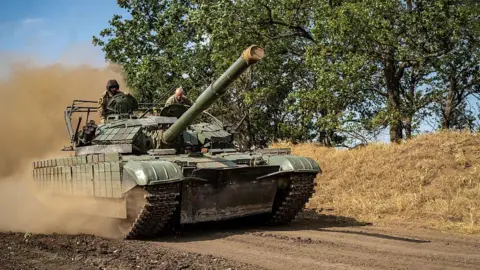In a significant declaration, European leaders have reaffirmed their strong stance on the preservation of Ukraine’s territorial integrity, explicitly stating that borders should not be altered by force. This announcement comes just days before a highly anticipated summit between Russian President Vladimir Putin and US President Donald Trump scheduled in Alaska. The statement, which garnered support from 26 out of 27 EU leaders, emphasizes the necessity for Ukrainians to have the autonomy to determine their own future amid ongoing conflicts.
The European leaders articulated the importance of respecting the principles of “territorial integrity” within their statement, insisting that international borders must remain unchanged through coercion. Notably absent from the signatories was Hungary’s Prime Minister Viktor Orban, who has maintained amicable ties with Russia and has often resisted EU initiatives intended to support Ukraine. This division within the EU highlights the complex geopolitical landscape surrounding the issue.
The timing and content of the statement underscore the escalating anxiety among European nations regarding Russia’s maneuvers in Ukraine. Many European countries, especially those sharing borders with Russia or those that bear memories of Soviet occupation, perceive a potential threat to their own security as the situation evolves. Noteworthy examples include Sweden and Finland’s recent accession to NATO, the reinstatement of conscription in Baltic states, and Poland’s investment of billions to fortify its border with Russia.
European history is riddled with instances of territorial disputes resolved through violent conflicts, and this alarming pattern has rekindled worries regarding the potential endorsement of Russian territorial claims in Ukraine by the United States. The recognition of territories acquired by force is viewed as intolerable by EU leaders, indicating their commitment to preventing similar outcomes in the ongoing conflict.
Adding to the complexity, President Trump has suggested that any potential peace negotiations may involve territorial compromises, such as Russia retaining control over the entire Donbas region and Crimea while considering the relinquishment of the Kherson and Zaporizhzhia regions back to Ukraine. This proposition has been met with skepticism, particularly as NATO Secretary-General Mark Rutte mentioned the importance of not formally recognizing any territorial changes in the conflict. Any formal acknowledgment would necessitate significant constitutional amendments and public approval through a national referendum, posing substantial political risks to President Volodymyr Zelensky’s administration.
Despite the intricacies of these negotiations, EU leaders maintain a firm commitment to Ukraine’s defense capabilities and pledged continued military support to Kyiv, which is exercising its inherent right to self-defense amidst aggression. The European Union formally asserted Ukraine’s right to determine its own destiny and committed to assisting the nation in its aspirations for EU membership.
Amidst this solidarity, however, the divergence in viewpoints became evident as Orban expressed his disassociation from the EU’s statement, criticizing it for attempting to influence a summit where the EU is not represented. He advocated for a European initiative to establish direct dialogues with Russia, despite the ongoing estrangement between the EU and Moscow since Russia’s invasion of Ukraine in February 2022.
As the international spotlight focuses on the upcoming meeting between Trump and Putin, Zelensky remains doubtful about the sincerity of Russia’s commitment to peace, pointing to military movements indicative of preparations for further offensive actions. Meanwhile, Ukraine’s armed forces reported a challenging operational environment but have downplayed claims of significant breakthroughs from Russian forces in the embattled area surrounding Pokrovsk in the Donetsk region.
As tension looms and discussions progress, European leaders are set to meet with Trump, alongside UK Prime Minister Sir Keir Starmer, to ensure that Ukrainian interests are prioritized in forthcoming diplomatic engagements. The challenge remains, however, to cultivate a peace that is not only just but also durable, a sentiment shared widely among EU nations as they navigate the complexities of the ongoing conflict in Ukraine and its broader implications for European stability.











